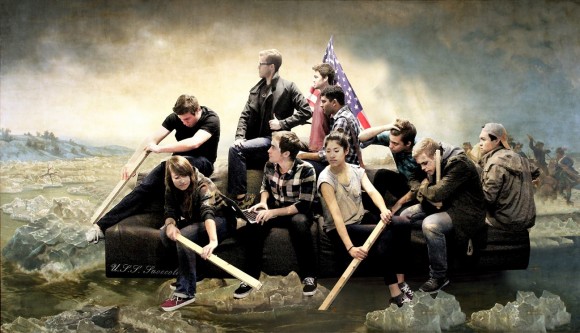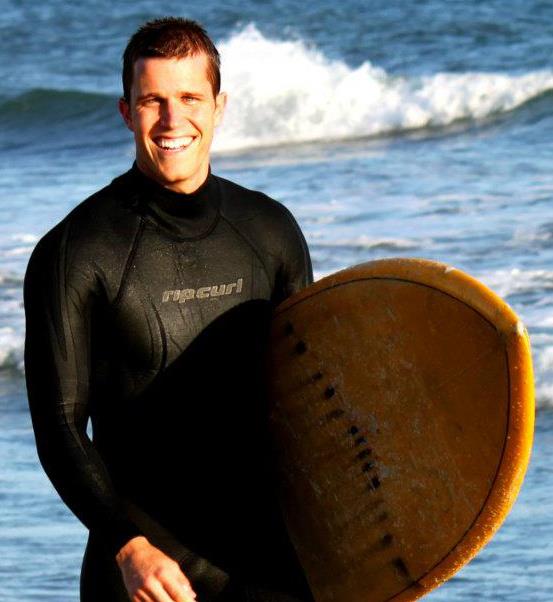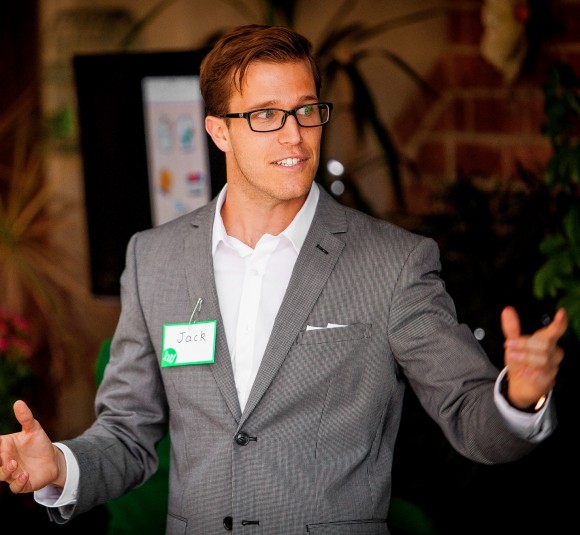Entrepreneur Jack Litchfield ’11 offers lessons in leadership
February 16, 2015
Jack Litchfield
, BFA film production ’11, has seen firsthand how a film degree goes exponentially further than just the silver screen. But while working at mixing houses, nonprofits and giant corporations after school has paid the bills, what Jack’s taken from Chapman University couldn’t be closer to Albert Schweitzer’s quest to search and see where he might invest his humanity. So today he’s after redefining corporate leadership, and doing it by serving.
Tell us about Kitchen Wizard – how did you go from film to mobile apps?

The Kitchen Wizard app delivers recipes to users based on what ingredients they already have.
Kitchen Wizard
is a mobile application that can suggest ingredients and recipes for users so they know what they can make right now with what they have. It also allows grocery stores to promote products based on a one-to-one relationship with their consumers. The end goal is to save users money by preventing spoilage, alleviating frustration and instilling a sense of accomplishment in the kitchen. Simultaneously, the app can help grocery stores raise their profit mix on selected items and dramatically reduce their marketing costs.
Now while I absolutely love what we’ve made for the phone, what inspires me and drives me the most is actually what we do with our team. I’m a big believer in people and I’ve found, through so many things in life, that the best way to lead is to humbly serve. I’ve blown it plenty at the head of things; every time I go back to see what happened, it always stems from pride. And that seems to be such a problem with leaders in C Suites, director’s chairs and relationships. Just because I’m at the head of a team, it doesn’t mean I’m better or need a golden seat. I want to be in the trenches with my interns and team, communicate effectively with them, and share the vision and all of our joys and struggles. I strive to challenge everyone, including myself, to rise to our potential rather than our comfort level and this starts by delving past the surface and going after who people are.

What’s so crazy about this passion is that I tested it first at Dodge College. When you need to lead 100 people, as I did on my thesis film, and you can’t pay them, you have to find ways to incentivize them. I found nothing works better than challenging people based on their passions. When you show that you are willing to go the extra mile, they follow. When you grab surprise coffees and dinners for your crew, they feel empowered. When you show that they are part of the team, that they are human, and that they matter, then you’ve tapped into something deeper than a paycheck. You have to seek out what is excellent about people, not just what they can do for you. You need to not lose sight of who people are in the midst of confusion or frustration in the mission. So ultimately, you become second. You maintain this vision and need to be strong; you become second to your team and to the goal. I was not a fan of the slogan “a film by John Doe.” That actually infuriated me. It’s a film by 118 people; you just happened to lead it.
So when I saw that the corporate world wasn’t after investing in me, and after a handful of years working for incredibly bureaucratic machines that suck a person’s soul out, I decided to start my own company and challenge the status quo. I thrive on challenge and am passionate about leading. Broken away from pursuing a career in what I knew in narrative storytelling, I was left with a desire to treat people better, and an odd love for cooking. I saw so many friends fail at their diets or eat expensively and unhealthily, and I wanted to make something to change that. I knew nothing about mobile applications, but I knew how to not give up. (Sound mixing and Foley at Dodge is funny like that – you get in the habit of saying, “I don’t know the answer now, but let’s change that and explore.”) So after about a year on my own, I was so grateful to be accepted into Chapman’s entrepreneurial incubator, and two years later, we are now on the market. So even though I’m not making films, I’m still using the same creative problem solving skills and real world leadership skills that were tested at Chapman. I found that my education wasn’t in directing and ProTools 8 sound editorial; it was in learning how to lead firsthand.
What insight would you give to current students and alumni who are aspiring leaders?
If I have to wrap this up in one statement, it’s search for ways to serve. Take your eyes off yourself and keep them on your vision and team. You’ll start to see that the rest will follow suit:
-
- Validate even when it hurts: You know your product in and out, but your customer, and sometimes even your team, doesn’t. Be ready to say, “I’m wrong,” and then jump back on the horse. Leaders don’t always have to be right, but they should never be obstinate.
-
- Small becomes big: Lean Methodology dictates that you should build the tiniest thing first and then let it grow. This goes just as well for products as it does for strategies and relationships. You want to see how your team handles money? Give each person $100. Their behavior with that will reflect what will happen when they have $25,000. There’s no need to be glamourous at the start and find out you made an expensive mistake because it looked or felt cool. The same goes with how you act; the tiny behaviors you do in your personal life (surfing, praying, working out, eating, sleeping, hiking, etc.) will manifest themselves in who you are with the suit on. Small becomes big.
-
- Challenges and struggles are good: Don’t be afraid to push your team. There is no way to build perseverance without sweat. If they’re there for the right reasons, they want to grow the company and themselves. You want the right people on your bus when it moves (thank you Good to Great and RA summer training for that quote). If your teammates don’t want to be challenged, then they don’t belong. Blowing it isn’t a metric for failure; apathy is. And you yourself should be challenged first in these things.
-
- Failure isn’t failure: The fight is over only when you say it is. Someone’s “no” doesn’t reflect the mindset of every human on the planet. (Sadly, nor does someone’s “yes”.) As sappy as it sounds, it’s true; there is always hope, no matter how dire the straits. And when you crash the ship for the 20th time, make sure you don’t crash it the same way again, but get back out to shore. Failure is a very productive way to learn with the right mentality.
-
- Do one thing well: This somewhat goes with ‘small becomes big’, but don’t overwhelm yourself. Do one thing well and let that thing grow. Don’t try to be great at 20 things. Be the best at one. After you conquer it, then move on.
What advice do you have for current students who want to make the most out of their time at Chapman?

There’s the obvious: find ways to challenge yourself (sports, clubs, films, etc). But I’d say the greatest thing Chapman gave me was freedom. If you don’t study abroad, you’re crazy. New Zealand was the best thing that happened to Jack; I found a way to love who I am, and in that confidence and thirst for adventure, could bring that back to lead well. Go surf. Go join Men of Harmony. Be an RA who does exotic adventures. Do things that are fun and explore your passion. (You won’t be able to draw it out of others when you can’t even get it out of your own heart.) Navy Seals who make it to the end of BUDs don’t do so just by being hardcore. They sleep and take care of themselves every opportunity that they can. Driving yourself into the grindstone is foolish. Paced well, you can love your life and exceed. So drink up being alive, which Chapman offers out the wazoo. It can naturally segue into loving others, which leads to serving, which leads to excellent leadership.
From your time at Chapman, which faculty member(s) made the greatest impact on you and why?
I’m going to include the
eVillage
here, as it’s so undersung. I’ll try to go chronologically:
-
- Dr. Eileen Jankowski pushed me to embrace learning for the sake of growing myself, rather than just passing a test.
-
- Harry Cheney, Dan Pavelin and Mike Kowalski pushed me to explore a passion in sound even when it wasn’t popular and challenged me to be better than average. They knew my potential and weren’t interested in settling below that. They also each demonstrated that professors are people too, and your leaders and mentors get joy out of watching you grow.
-
- Dave Kost proved to me what dedication to helping looks like and taught me that being nice is way less valuable than being tough. I almost never got my way with this guy. Good.
-
- Bob Godlaski is just simply wise and he took me from a scrappy young child to a CEO through consistent support, challenge and guidance. Everyone needs their Yoda, and mine’s Bob.
How has your Chapman degree helped you in your professional and personal life?
My Chapman degree is a piece of paper that says BFA in film production with a minor in history. It’s gotten me in to the doors of offices, on the news and helped me take steps forward. My Chapman education, though, is of immeasurable value. What the piece of paper misses is learning how to treat others, how to lead in relationships, how to forgive, how to get back up. It doesn’t show you that I learned to surf, skydive, ice climb, kayak, memorize the Greek alphabet and joined the Japanese Sword Fighting Club. I don’t always win or be perfect at what I go for, and this includes Kitchen Wizard, relationships, jobs and the like. But what I do know is that I can push past “failures” and what is behind me to move forward toward what is ahead, and I can go after people for who they are instead of what they can do for me. When you spend time serving as an RA or as the class president or as a leader in the “small roles”, it forges who you will be for the big ones. I came out a better man because of how well rounded Chapman was, from Dodge to intramural soccer. To come out a better person, you are going to have to say yes to things that seem uncomfortable at first but make you come alive in the end.
What is your favorite Chapman memory?
Oh man, I wish I had a more tear-jerking, poetic thing here, but scoring a tri in the hail in New Zealand after being the last walk on for the University Rugby Club in the only game I got to start was pretty amazing. It felt like the movie
Rudy
. It was worth all the rain and muck and work to just get on the team for that one shot.
Have you been involved with Chapman since graduating?
I have marveled at students who leave and feel like Chapman hasn’t been helping them out. I am at the
Launch Labs
, in their brand new building, getting space for my team’s office, getting mentorship from hundreds of professionals, drinking their coffee and getting publicity through them (for example, this post)…all for free. I could reach out to any professor or faculty member and they would have some avenue to send me down. Jerry Price, Michelle Cooper, ResLife, film and Phi Kappa Tau have all come in to play in regard to Kitchen Wizard. Our team itself is comprised of three shareholders with Chapman degrees and seven of our interns have been Panthers. Some of my key mentors (and now our banker) went through the Argyros School of Business (shout out to
Rob Selway
at Citizens Business Bank and
Mike Brown
at ModBargains). In reality, based on the amount of support I’ve gotten from Chapman and the alumni, it seriously feels like I haven’t left the network at all.
Is there anything else you’d like to share with the Chapman Family?
We’re all about feedback with our app. We have a beta test available on the iPhone app store right now if you search for Kitchen Wizard. It’s free and I’d love for you to email me your thoughts at
jack@kitchenwizard.com
. Around May 1 we are planning to roll out our full, redesigned version, but until then, there’s no reason you can’t help us build it! I also strongly encourage you to
check out the Launch Labs
! Not only is it not a fountain, but we have a ping pong table.
Explore and Connect Further:
-
Want to be featured in a blog like this, on social media or in Chapman Magazine? Share your news with us »
-
Want to catch up with alumni friends? Attend our next event »
-
Want to get involved with your alma mater? Volunteer with us or join an alumni group »
-
Who doesn’t like a good deal? Check out your alumni benefits and discounts »
-
Want to receive the monthly alumni e-newsletter and stay connected with Chapman? Make sure we have your current contact info »


